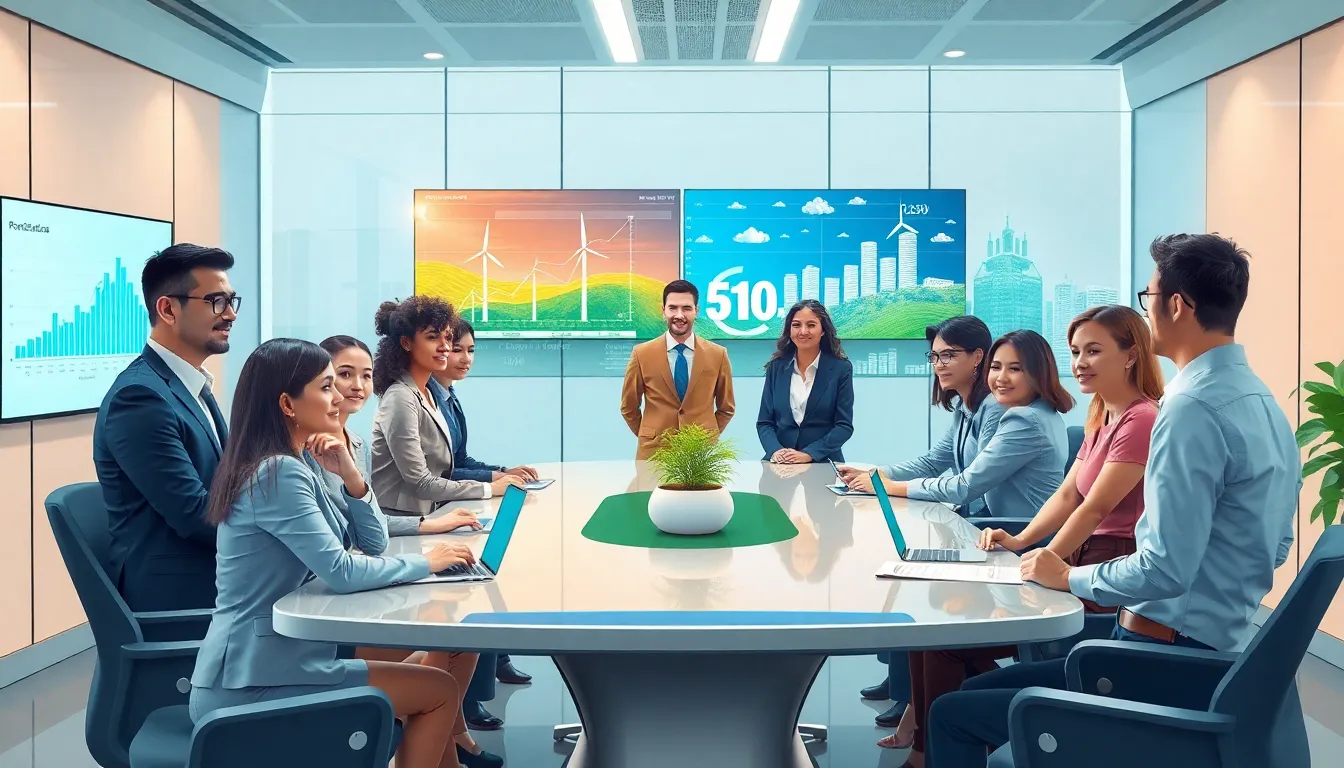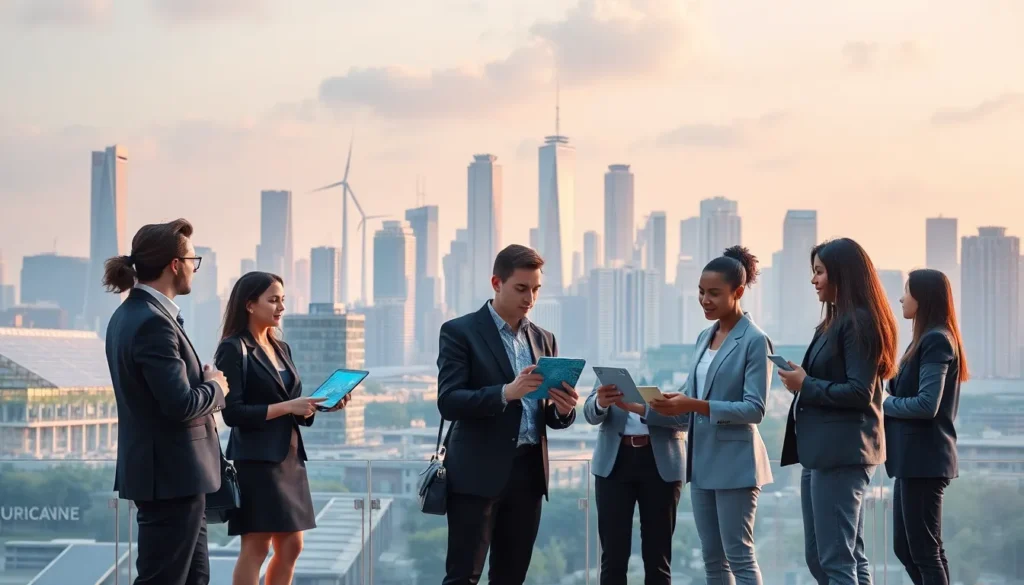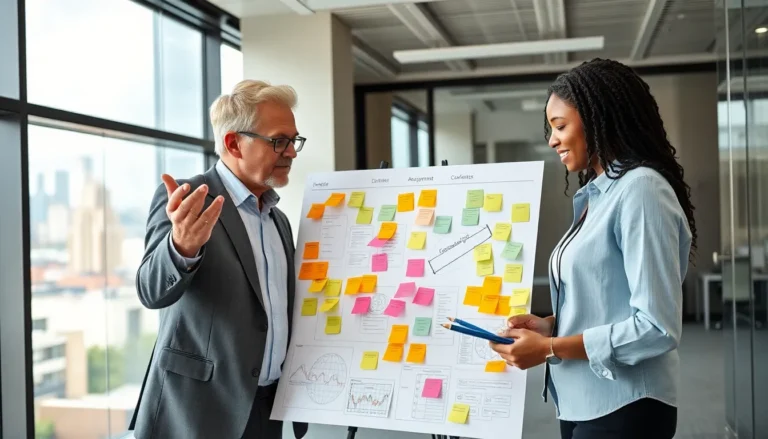Table of Contents
ToggleImagine a world where flying cars are as common as coffee shops and robots handle all the chores. Sounds like a sci-fi movie, right? Yet, as technology races ahead, the line between fiction and reality blurs. Predictions about the future aren’t just for crystal ball gazers anymore; they’re essential for navigating the twists and turns of modern life.
From AI companions to climate solutions, the future holds a treasure trove of possibilities. Whether you’re a tech enthusiast or a casual observer, understanding these predictions can spark excitement and maybe even a little anxiety. Who wouldn’t want to know what tomorrow holds? Buckle up as we dive into the wild and wacky world of future predictions, where the only certainty is uncertainty—and perhaps a few flying cars.
Predictions of the Future: An Overview
Predictions about the future encompass various domains, including technology, health, and the environment. Experts frequently focus on advancements in artificial intelligence, which may reshape interactions and enhance personal and professional experiences. Climate innovations gain attention, with solutions aimed at mitigating challenges like global warming and resource scarcity.
Artificial intelligence, particularly, shows promise in areas like automation and data analysis. Research suggests AI could increase productivity by up to 40% in certain sectors. Smart cities, powered by IoT devices, may transform urban living, improving energy efficiency and mobility.
In health, biotechnology advancements could lead to personalized medicine. Genes may become the basis for tailored treatments, enhancing effectiveness and reducing side effects. Wearable health technology also gains traction, allowing continuous monitoring and proactive health management.
Predictions related to environmental sustainability emphasize renewable energy. Transitioning to solar and wind resources could meet increasing energy demands while reducing carbon footprints. According to the International Energy Agency, renewable energy sources are expected to account for over 30% of global electricity by 2025.
Societal changes also emerge in future predictions. Remote work trends may persist, significantly altering traditional office environments. Many employees prefer flexible work arrangements, which could influence urban development and real estate markets.
Understanding these predictions equips individuals and organizations to navigate complexities. Keeping informed about technological innovations and societal shifts fosters preparedness for the opportunities and challenges shaping the future.
Trends Shaping the Future

Understanding emerging trends is crucial for anticipating significant changes. Several key areas will define the future landscape.
Technological Advancements
Artificial intelligence continues to transform various sectors. Research indicates AI could enhance productivity by up to 40% in industries such as finance and healthcare. Innovations in machine learning create new efficiencies in everyday tasks. Augmented reality enhances user experiences across fields, from education to entertainment. Companies increasingly adopt automation technologies, streamlining operations. The growing reliance on AI companions reshapes personal interactions, making technology an integral part of daily life.
Environmental Changes
Global emphasis on renewable energy sources accelerates. Projections suggest renewables will represent over 30% of global electricity generation by 2025. Technological advancements in solar and wind energy drive this shift. Emissions reduction strategies become essential as climate concerns rise. Nations and organizations push for sustainable practices, influencing policy and industry standards. Innovations in carbon capture technology emerge as vital solutions to combat climate change. Efforts to integrate sustainability into urban planning reshape city landscapes, prioritizing green spaces and efficient resource use.
The Role of AI in Future Predictions
Artificial intelligence transforms the landscape of future predictions across various sectors. Organizations harness AI technologies to analyze large datasets, uncovering trends that may not be apparent through traditional methods. Enhanced predictive capabilities enable businesses to anticipate market shifts and consumer behavior with greater accuracy.
Machine learning algorithms improve continuously, processing information quickly and efficiently. These advancements lead to significant increases in productivity, with evidence suggesting a potential boost of up to 40% in certain industries. AI applications in healthcare, for instance, facilitate personalized medicine by analyzing genetic information, thus improving patient outcomes.
Cities utilize AI to enhance urban planning and resource management. By predicting population growth and traffic patterns, smart city initiatives become more effective in addressing infrastructure needs. Sustainable practices emerge as key priorities, with AI guiding decisions on renewable energy integration and efficient land use.
AI-driven climate models provide insights into future environmental scenarios. These models assist policymakers in determining strategies to combat climate change. By evaluating the effectiveness of various approaches, AI empowers stakeholders to make informed decisions that influence resource allocation and regulatory measures.
Personal and professional interactions evolve due to AI companions and virtual assistants. Relying on these tools can streamline daily tasks and improve work-life balance, resulting in enhanced satisfaction and efficiency. Organizations increasingly adopt AI for employee training, personalizing learning experiences to boost skills development.
Understanding the role of AI in future predictions sets the groundwork for navigating emerging challenges. Businesses and individuals gain insight into leveraging AI advancements, preparing them for opportunities that lie ahead. These developments create a framework for tackling future uncertainties, ensuring a proactive approach in ever-changing environments.
Societal Changes and Predictions
Societal transformations will shape the future significantly. Expectations of demographic shifts signal notable changes in population dynamics and cultural landscapes.
Demographic Shifts
Aging populations in many countries forecast increased demand for healthcare services. Younger generations, particularly millennials and Gen Z, show preferences for flexible work arrangements, influencing corporate policies. Migration patterns also affect urban development as populations move toward city centers for job opportunities. Urban areas could experience swelling populations while rural areas may see declines. Emerging market economies might witness substantial youth populations driving innovation and consumption trends. Predictive models estimate that by 2030, the global population will reach approximately 8.5 billion, adding pressure on resources and services.
Cultural Evolution
Cultural evolution reflects shifts in values and behaviors driven by technology and globalization. Increased connectivity through the internet allows diverse cultures to share and adopt practices rapidly. Media consumption has evolved, with streaming services and social media platforms altering entertainment preferences. Furthermore, societal norms surrounding work-life balance continue to evolve, prioritizing mental health and well-being. Increased awareness of social justice issues influences consumer choices and corporate responsibility. As a result, future cultural landscapes will likely blend tradition and innovation, fostering inclusivity and collaboration across global communities.
The future holds immense potential shaped by technological advancements and societal changes. As AI continues to evolve it will redefine interactions and enhance productivity across various sectors. Innovations in renewable energy and biotechnology promise to address pressing global challenges while improving quality of life.
Understanding these emerging trends is crucial for individuals and organizations alike. By anticipating shifts in technology health and culture they can better navigate the complexities of tomorrow. Embracing the unknown with curiosity and preparedness will empower everyone to seize opportunities and tackle challenges as they arise. The journey into the future is just beginning and it’s filled with possibilities waiting to be explored.







